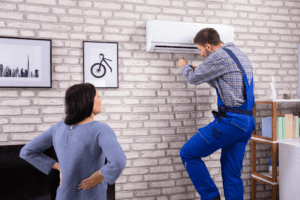Due to the complicated nature of commercial HVAC systems, many questions may arise on how to maintain them in a sustainable, environmentally conscious way. An added complication for businesses is that you cannot forget the bottom line, and ultimately you need to find solutions that will consistently work over time. It’s essential to make sense of these often-conflicting commercial air conditioning maintenance concerns, so you can run your business in a way that keeps air quality optimal without sending you into the red.
Identify Essential Commercial Air Conditioning Maintenance Practices First
 The first step in creating an effective and stable plan to keep your systems running properly, while minimizing your environmental impact, is to identify what your core needs are. Depending on your system, it may either be a combination of multiple single-room units, such as box splits, or a comprehensive heating and air conditioning system with central forced air. Maintenance for these systems can vary wildly, so consult your commercial HVAC installer for the most accurate information if you have questions about your system’s filter locations.
The first step in creating an effective and stable plan to keep your systems running properly, while minimizing your environmental impact, is to identify what your core needs are. Depending on your system, it may either be a combination of multiple single-room units, such as box splits, or a comprehensive heating and air conditioning system with central forced air. Maintenance for these systems can vary wildly, so consult your commercial HVAC installer for the most accurate information if you have questions about your system’s filter locations.
For multiple machine systems, each unit will have its own filter. For many box splits and other individual units, their air filters are permanent that need to be cleaned regularly but changed rarely. Cleaning these filters often does not involve using a soap or degreaser, but instead may be vacuumed, wiped clean, or rinsed through running water and left to dry for 24 hours before being returned to the unit. With regular maintenance, you can get many years of use from these filters, but eventually, they will degrade and need replacing.
Use Care When Maintaining Central HVAC Systems
Central air conditioning machines are significantly different from individual units. To begin with, there’s the added component of duct cleaning. If you neglect to service your ducts regularly, you can experience a buildup of dust and other material which overtaxes your filters and negatively impacts your air quality.
Once you’ve secured a routine cleaning method for your ducts, whether in-house or through a capable contractor, you can look at the routine maintenance your team can handle. The most crucial component both for air quality and system effectiveness is the filter. For multi-room systems, there will often be multiple areas where disposable air filters will be installed. As you conduct commercial air conditioning maintenance on your system, you must ensure that you know the locations and orientation of your air filters.
For businesses with multiple floors, there will often be several locations where you are taking in air—which is also true for businesses in larger buildings that may need several access points. To maintain a standard air pressure, your HVAC system pulls in air from the room while it’s producing cooled air. Each access point will have its own filter that will need periodic maintenance.
Filter Disposal: Can They Be Recycled?
While recycling regulations vary depending on the municipality, there are several facts about commercial air conditioning filters that are true across the board. The permanent filters for single-room units are generally not recyclable. They tend to be made of the same hard plastics and metals that comprise the air conditioner itself. While in some cases they can be repurposed, the best case is to dispose of them in the garbage or with a scrap salvage service that accepts the materials.
It may seem more likely to recycle the disposable filters used for whole-building forced-air HVAC systems, but ultimately the prognosis is not much better. We recommend you replace these filters every three months, or at the beginning of summer if the system is only used for air conditioning in the summer. You may notice that these filters tend to have a cardboard frame, then a mixture of materials for the filter itself.
Most disposable filters are made from woven fibers of various kinds. The most common components are fiberglass and polyester, though you may also find paper ones. While paper is recyclable, it’s less common to find polyester accepted by recycling companies. Fiberglass is not recyclable by any firm and must be disposed of in the trash. Beyond the materials, disposable filters are also contaminated by the air particulates and dust they have accrued. Your best bet is to go to a local recycling centre for safe disposal of filters.
HVAC Maintenance and Disposal: A Reasoned Approach
When taking the above considerations together, the conclusion is that these systems don’t regularly interact with your recycling opportunities. The best way to minimize your environmental impact is to reduce energy usage where possible, schedule routine commercial air conditioning maintenance, and only upgrade or replace your system as needed. Because there are no ways to recycle the systems or filters, spend the time to find a local commercial hvac installer for your maintenance needs that can do the job efficiently and keeps your costs low.

